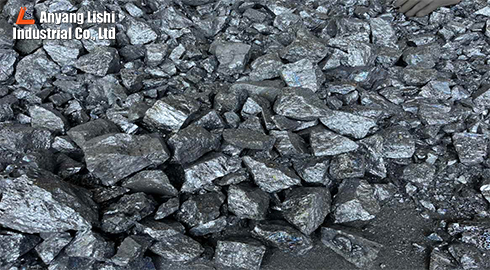Silicon Metal, also known as industrial silicon or crystalline silicon, is a non-ferrous alloy composed of silicon and small amounts of impurities, including iron, aluminum, and calcium. The silicon content is usually above 98.5%. It is an essential material in modern industrial production, with applications in metallurgy, chemicals, electronics, photovoltaics, and new energy.
Definition and Properties

Main Application Areas
Metallurgy (about 40%)
Deoxidizer: In steelmaking, Silicon Metal reacts with oxygen in molten steel to form silicon dioxide. This removes oxygen and improves steel quality and structure.
Silicon Steel: Adding 0.8%–4.8% silicon to steel increases resistivity, reduces iron loss, and improves magnetic properties. It is widely used in motors, transformers, and generators.
Alloy Steel and Cast Iron: In spring steel, bearing steel, gray cast iron, and ductile iron, silicon improves strength, wear resistance, and promotes graphitization.
Heat and Corrosion Resistance: Silicon improves steel performance in high-temperature and corrosive environments. It is used in stainless steel and heat-resistant steel.
Chemical Industry (about 30%)
Organosilicon Monomers: Silicon Metal reacts with methyl chloride to produce methylchlorosilanes. These are used to make silicone rubber, silicone oil, silicone resin, and silane coupling agents. The products are used in sealing, lubrication, insulation, and surface modification.
New Energy and Photovoltaics (about 25%)
Solar Cells: Silicon Metal is purified into polysilicon for monocrystalline and multicrystalline solar cells.
Lithium-ion Battery Anodes: Silicon-carbon composite materials can increase battery energy density. They are being applied in power and energy-storage batteries.
Other Fields
Semiconductors: High-purity silicon is used to produce single-crystal wafers for chip manufacturing.
Refractories: Silicon powder is combined with silicon carbide and silicon nitride for furnace linings.
Aerospace: Silicon-aluminum alloys and silicon bronze are used for high-temperature structural parts.
Market Overview
In 2024, Silicon Metal exports reached 732,066 tons, reflecting stable global demand. Growth in photovoltaics, energy storage, and high-performance materials continues to expand the value chain of this industry.
Industry Outlook
Future developments include lower-cost purification methods and large-scale use of silicon-based anode materials. Green production capacity and the expansion of downstream new energy industries are expected to create new market opportunities.
LSFerroalloy Advantage
As a professional metallurgical materials supplier, LSFerroalloy leverages stable raw material sourcing, strict quality control, and customized services to supply high-quality Silicon Metal and alloy products to steel mills, aluminum plants, chemical enterprises, and new energy companies worldwide. We ensure stable performance, reliable delivery, and long-term value for our global partners.
